Subscribe to our newsletter
The State of Open Data 2023: A more analytical approach provides unparalleled insights
Digital Science, Figshare and Springer Nature are proud to publish The State of Open Data 2023. Now in its eighth year, the survey is the longest-running longitudinal study into researchers’ attitudes towards open data and data sharing.
The 2023 survey saw over 6,000 responses and the report that has now been published takes an in-depth look at the responses and purposefully takes a much more analytical approach than has been seen in previous years, unveiling unprecedented insights.
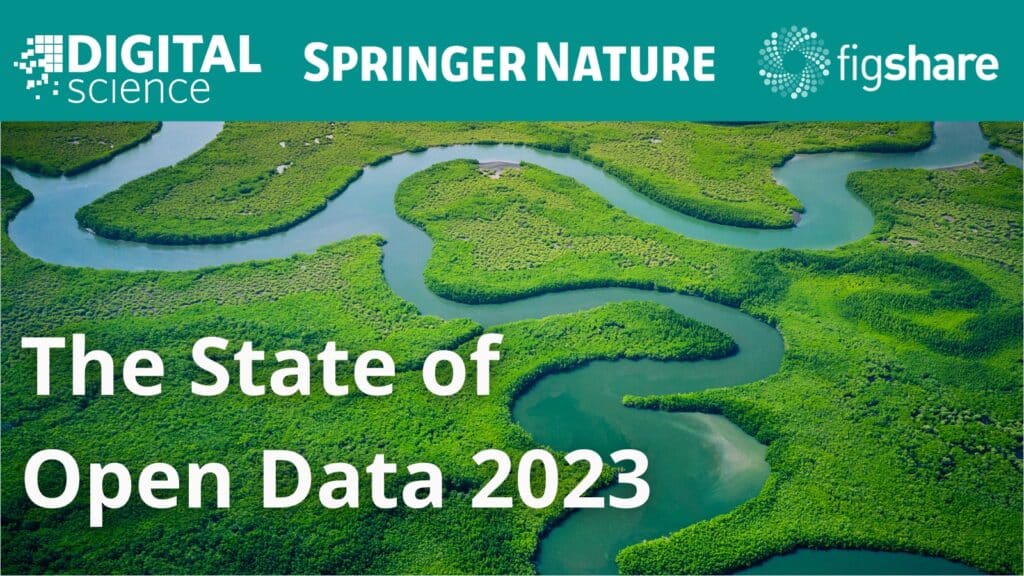
Five key takeaways from The State of Open Data 2023
Support is not making its way to those who need it
Over three-quarters of respondents had never received any support with making their data openly available.
One size does not fit all
Variations in responses from different subject expertise and geographies highlight a need for a more nuanced approach to research data management support globally.
Challenging stereotypes
Are later career academics really opposed to progress? The results of the 2023 survey indicate that career stage is not a significant factor in open data awareness or support levels.
Credit is an ongoing issue
For eight years running, our survey has revealed a recurring concern among researchers: the perception that they don’t receive sufficient recognition for openly sharing their data.
AI awareness hasn’t translated to action
For the first time, this year we asked survey respondents to indicate if they were using ChatGPT or similar AI tools for data collection, processing and metadata creation.
Diving deeper into the data than ever before
This year, we dive deeper into the data than ever before and look at the differing opinions of our respondents when we compare their regions, career stages, job titles and subject areas of expertise.
Figshare founder and CEO Mark Hahnel said of this approach, “It feels like the right time to do this. Whilst a global funder push towards FAIR data has researchers globally moving in the same direction, it is important to recognize the subtleties in researchers’ behaviors based on variables in who they are and where they are.”
This year features extensive analysis of the survey results data and provides an in-depth and unique view of attitudes towards open data.
This analysis provided some key insights; notably that researchers at all stages of their careers share similar enthusiasm for open data, are motivated by shared incentives and struggle to overcome the same obstacles.
These results are encouraging and challenge the stereotype that more experienced academics are opposed to progress in the space and that those driving progress are primarily early career researchers.
We were also able to look into the nuanced differences in responses from different regions and subject areas of expertise, illuminating areas for targeted outreach and support. These demographic variations also led us to issue a recommendation to the academic research community to look to understand the ‘state of open data’ in their specific setting.
Benchmarking attitudes towards the application of AI
In light of the intense focus on artificial intelligence (AI) and its application this year, for the first time, we decided to ask our survey respondents if they were using any AI tools for data collection, processing or metadata collection.
The most common answer to all three questions was,“I’m aware of these tools but haven’t considered it.”
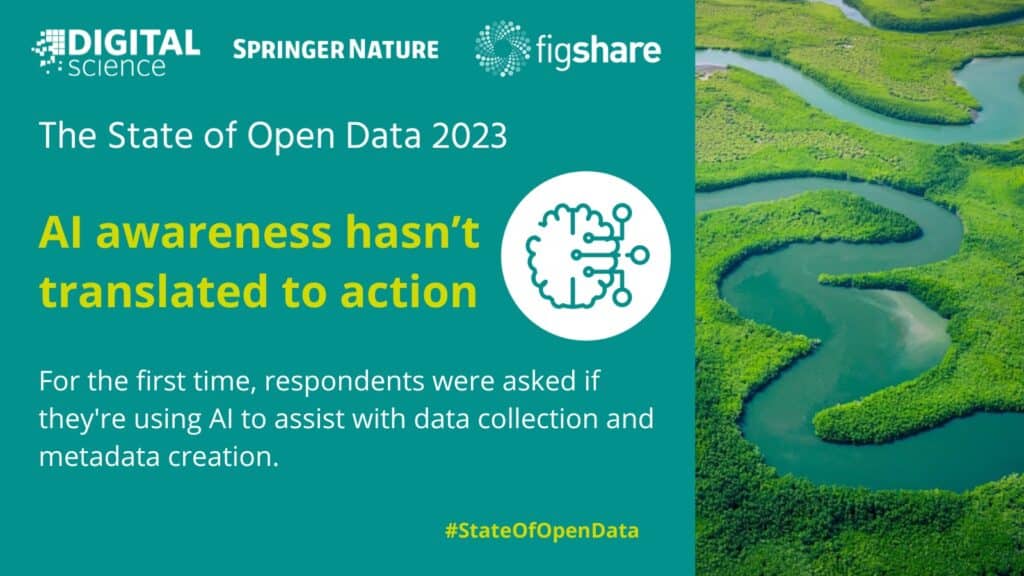
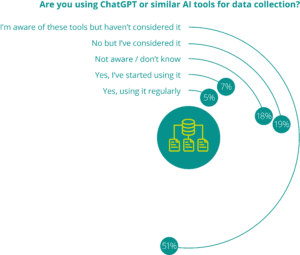
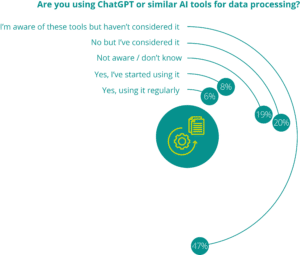
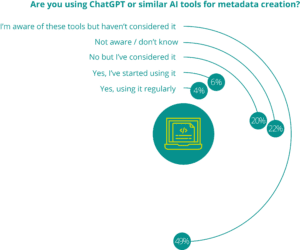
Although the results don’t yet tell a story, we’ve taken an important step in benchmarking how researchers are currently using AI in the data-sharing process. Within our report, we hear from Niki Scaplehorn and Henning Schoenenberger from Springer Nature in their piece ‘AI and open science: the start of a beautiful relationship?’ as they share some thoughts on what the future could hold for research data and open science more generally in the age of AI.
We are looking forward to evaluating the longitudinal response trends for this survey question in years to come as the fast-moving space of AI and its applications to various aspects of the research lifecycle accelerate farther ahead.
Recommendations for the road ahead
In our report, we have shared some recommendations that take the findings of our more analytical investigation and use them to inform action points for various stakeholders in the community. This is an exciting step for The State of Open Data, as we more explicitly encourage real-world action from the academic community when it comes to data-sharing and open data.
Understanding the state of open data in our specific settings: Owing to the variations in responses from different geographies and areas of expertise, we’re encouraging the academic community to investigate the ‘state of open data’ in their specific research setting, to inform tailored and targeted support.
Credit where credit’s due: For eight years running, our respondents have repeatedly reported that they don’t feel researchers get sufficient credit for sharing their data. Our recommendation asks stakeholders to consider innovative approaches that encourage data re-use and ultimately greater recognition.
Help and guidance for the greater good: The same technical challenges and concerns that pose a barrier to data sharing transcend different software and disciplines. Our recommendation suggests that support should move beyond specific platform help and instead tackle the bigger questions of open data and open science practices.
Making outreach inclusive: Through our investigation of the 2023 survey results, we saw that the stage of an academic’s career was not a significant factor in determining attitudes towards open data and we saw consensus between early career researchers and more established academics. Those looking to engage research communities should be inclusive and deliberate with their outreach, engaging those who have not yet published their first paper as well as those who first published over 30 years ago.
What’s next for The State of Open Data?
The State of Open Data 2023 report is a deliberate change from our usual format; usually, our report has contributed pieces authored by open data stakeholders around the globe. This year, we’ve changed our approach and we are beginning with the publication of this first report, which looks at the survey data through a closer lens than before. We’ve compared different subsets of the data in a way we haven’t before, in an effort to provide more insights and actionable data for the community.
In early 2024, we’ll be releasing a follow-up report, with a selection of contributed pieces from global stakeholders, reflecting on the survey results in their context. Using the results showcased in this first report as a basis, it’s our hope that this follow-up report will apply different contexts to these initial findings and bring new insights and ideas.
In the meantime, we’re hosting two webinars to celebrate the launch of our first report and share the key takeaways. In our first session, The State of Open Data 2023: The Headlines, we’ll be sharing a TL;DR summary of the full report; our second session, The State of Open Data 2023: In Conversation, will convene a panel of global experts to discuss the survey results.
You can sign up for both sessions here:
The State of Open Data 2023: The Headlines
The State of Open Data 2023: In Conversation

About the Author
Laura Day, Marketing Director | Figshare
Laura is the Marketing Director at Figshare, part of Digital Science. Before joining Digital Science, Laura worked in scholarly publishing, focusing on open access journal marketing and transformative agreements. In her current role, Laura focuses on marketing campaigns and outreach for Figshare. She is passionate about open science and is excited by the potential it has to advance knowledge sharing by enabling academic research communities to reach new and diverse audiences.
